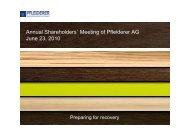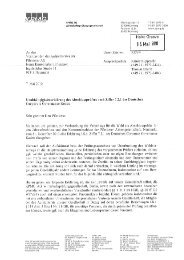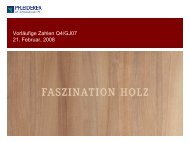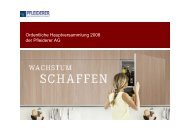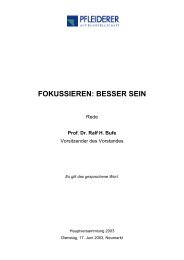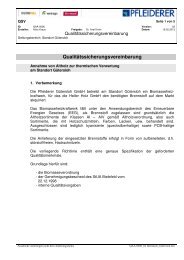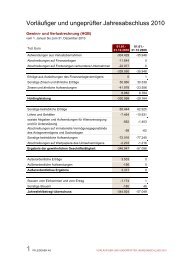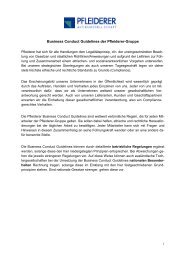PDF, 1.2 MB - Pfleiderer AG
PDF, 1.2 MB - Pfleiderer AG
PDF, 1.2 MB - Pfleiderer AG
Create successful ePaper yourself
Turn your PDF publications into a flip-book with our unique Google optimized e-Paper software.
86 being focused: being better<br />
In April 2002, the FASB issued SFAS 145, “Rescission of FASB Statements No. 4, 44,<br />
and 64, Amendment of FASB Statement No. 13, and Technical Corrections.” This statement<br />
re-regulates gains and losses on premature extinguishments of debt, as well as the treatment<br />
of transactions from financing leases which are treated as rental agreements in future due to<br />
modifications of the agreement. These transactions must be treated as sale and leaseback<br />
transactions in accordance with SFAS 98. SFAS 145 also contains diverse technical changes.<br />
The provisions of SFAS 145 are effective for fiscal years beginning after May 15, 2002, although<br />
they can be applied prior to this date. The Company will apply SFAS 145 from January<br />
1, 2003. The Company does not expect the application of SFAS 145 to have a significant<br />
impact on the consolidated financial statements.<br />
In July 2002, the FASB issued SFAS 146 “Accounting for Costs Associated with Exit or<br />
Disposal Activities”, which annuls Emerging Issues Task Force (EITF) Issue 94-3, “Liability<br />
Recognition for Certain Employee Termination Benefits and Other Costs to Exit an Activity (including<br />
Certain Costs Incurred in a Restructuring).” SFAS 146 requires that expenses resulting<br />
from the exit or disposal of activities be first recognized when costs resulting from an obligation<br />
to a third party are incurred, and not at the point in time when the management has<br />
committed to an exit or disposal plan. These expenses include certain compensation payments<br />
to employees, costs incurred through early termination of contracts and costs related to the<br />
closure of plants or the relocation of employees. SFAS 146 also rules that the obligation be<br />
valued at fair market value and modified in accordance with estimated cash flows. The rules of<br />
the new statement are to be applied where there is a prospect of closure or sale of operations<br />
which will be initiated after December 31, 2002. The statement can be applied earlier. Calculations<br />
of any effects arising from application of SFAS 146 on the consolidated financial<br />
statements have not been concluded. The Company will apply the statement from January 1,<br />
2003.<br />
In October 2002, the FASB issued SFAS 147 “Acquisitions of Certain Financial Institutions<br />
– an Amendment of FASB Statement No. 72 and 144 and FASB Interpretation No. 9.”<br />
This standard deals with how to account for the acquisition of a financial institution, as well as<br />
how to account for long-standing customer relationships as intangible assets in connection<br />
with SFAS 144 “Accounting for the Impairment or Disposal of Long-Lived Assets”. SFAS 147<br />
must be applied to fiscal years starting after October 1, 2002. The Company will apply SFAS<br />
147 with effect from January 1, 2003. <strong>Pfleiderer</strong> does not expect the application of SFAS 147<br />
to have a significant impact on the consolidated financial statements.<br />
In December 2002, the FASB issued SFAS 148 “Accounting for Stock-Based Compensation<br />
– Transition and Disclosure”. SFAS 148 amends FASB Statement No. 123 “Accounting<br />
for Stock-Based Compensation” and offers alternative methods of transition to the fair-value<br />
method under SFAS 123. SFAS 148 also changes the disclosure requirements for the notes<br />
under SFAS 123 and APB Opinion No. 28 “Interim Financial Reporting”. Accordingly, in the<br />
summary of main accounting principles, the effect of the method of accounting chosen (either<br />
APB 25 or SFAS 123) on results and earnings per share with regard to employee subscription<br />
rights must be given in the annual and quarterly reports. SFAS 148 does not require the company<br />
to use the fair-value method pursuant to SFAS 123. However, all companies must prepare



